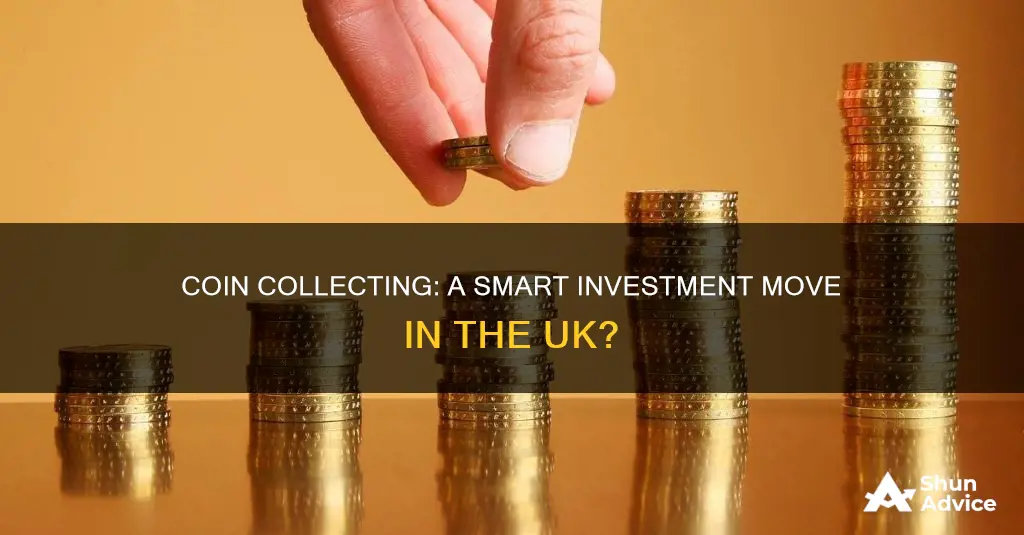
Gold and silver coins can be a good investment, but it's important to do your research and understand the potential risks. Coins can be a profitable long-term investment, offering significant profit potential above and beyond the underlying metal value. They can also add diversity to a portfolio that is focused on stocks and bonds.
Gold coins, in particular, have been a popular choice for investors for hundreds of years due to their value and stability. Gold is a valuable commodity across the world and is often more stable than other forms of currency, such as paper money, which can be affected by economic crises. Silver coins, such as Silver Britannias, also offer unique tax advantages and strong liquidity for British investors.
Rare coins are another option for investors. They can provide long-term gains but are not ideal for short-term profits. The rare coin market can fluctuate, and it's important to be aware of the potential for counterfeit or doctored coins.
Overall, investing in coins can be a good option, but it's important to understand the risks and do your research before making any decisions.
| Characteristics | Values |
|---|---|
| Popularity | Gold coins have been a popular investment choice for hundreds of years. |
| Value | Gold is a valuable commodity across the world. |
| Stability | Gold is more stable than other forms of currency, such as paper money, which can be affected by economic crises. |
| Tax advantages | Gold coins can be exempt from British Capital Gains Tax if they are legal tender. |
| Affordability | Gold coins are more affordable than gold bars. |
| Flexibility | Gold coins can be traded in smaller amounts than gold bars. |
| Storage | Gold coins are easier to store than gold bars. |
| Accessibility | Gold coins are more accessible to first-time investors than gold bars. |
| Diversification | Gold coins can add diversity to an investment portfolio focused on stocks and bonds. |
| Liquidity | Gold coins have strong liquidity and are easily traded. |
| Volatility | Gold coins are subject to significant short-term swings and periods of market turbulence. |
| Counterfeiting | There is a risk of counterfeit gold coins. |
| No yield | Gold bullion coins do not provide interest or income. |
| Tax implications | Selling gold coins may create tax liabilities in certain jurisdictions. |
What You'll Learn

Gold coins are a stable investment
Gold coins, in particular, offer several benefits. They are easily stored and require little maintenance. In the UK, certain gold coins are classed as legal tender, which gives them tax benefits. For example, any profits made from buying and selling these coins are tax-free. Gold coins also have good liquidity, making them easy to trade at transparent prices.
Additionally, gold coins can be a good investment during times of economic and geopolitical uncertainty. Gold is often seen as a "safe haven" asset when there is tension and conflict in the world, as its price often rises when confidence in governments is low.
Finally, gold has real-world applications in industries like electronics and dentistry, giving it intrinsic value.
Smart Bitcoin Investing: Making Money Strategies
You may want to see also

Silver Britannias are tax-efficient
Silver Britannias are an excellent investment option for UK investors due to their unique tax advantages. As legal tender coins issued by the British Royal Mint, Silver Britannias are exempt from British Capital Gains Tax (CGT). This means that any profits made from selling these coins are not subject to taxation, providing a significant financial benefit for investors.
The tax-free status of Silver Britannias sets them apart from other silver bullion coins and makes them a more attractive option for those looking to build their investment portfolio. This exemption is due to their legal tender status, as the UK government cannot tax the movement of its own legal currency.
In addition to their tax advantages, Silver Britannias offer strong liquidity, making them easy to buy and sell at transparent prices. They also carry lower premiums over the spot price of silver than many competitor coins, making them more cost-efficient to accumulate in volume.
The Royal Mint's reputation for quality and the cultural significance of the Britannia design further enhance the appeal of Silver Britannias. The coins have a long history, with the iconic image of Britannia, the female personification of Britain, dating back to Roman times.
Overall, Silver Britannias offer UK investors a beautiful silver coin with strong liquidity, tax advantages, and competitive premiums, making them a smart choice for those looking to add precious metals to their portfolio.
US Mint Coins: Worthy Investment or Waste of Money?
You may want to see also

Rare coins can be profitable
Coin collecting is a popular hobby for people of all ages and is also a medium of investment. Rare coins are particularly profitable due to their historical context and the limited number of mints.
The Stanley Gibbons GB200 Rare Coin Index, which measures the value of 200 of the most sought-after British coins, rose by more than 6% last year. Over ten years, the index has gone up by 195%, averaging just over 10% annually.
Some of the most valuable and rare UK coins include:
- The Kew Gardens 50p coin, minted in 2009, with only 210,000 units in circulation.
- The 1933 George V Penny, a bronze coin commemorating King George V. Only seven specimens were minted, and only four are known to exist today. One of these coins was auctioned in 2016 and reached a price of 78,852 USD.
- The 1917 Sovereign George V, a gold coin with a face value of one pound, minted after World War I. Only 1,014,999 pieces were minted, making it a rare and valuable coin.
- The 1937 Brass Threepence Edward VIII, a proof coin not adopted for circulation. It is estimated that only 10-12 units of this coin were minted, making it extremely rare and valuable.
- The 1994 Bank of England 300th Anniversary two-pound coin, minted in gold. It is believed that a few hundred of these coins were minted in error, making them highly sought-after by collectors.
- The 1973 50 pence European Economic Community silver proof piedfort, a rare variant of the cupronickel coin minted to commemorate the UK's entry into the EEC. Its valuation today may exceed 3,000 GBP.
- The 1996 two-pound Football European Championships gold coin with a flat surface. This variant is extremely rare and valuable, with a value of up to 1,700 GBP.
- The 1983 2p "New Pence" error coin, which was mistakenly minted with the old inscription of "New Pence" instead of "Two Pence." These coins are rare and can be sold for upwards of 20 GBP.
- The 2011 Aquatics 50p coin, a rare variant of the London 2012 Olympics 50p coin. The swimmer's face is covered by water currents, and only 600 units of this variant were minted. It can be sold for around 590-820 GBP.
- The 2008 undated 20p coin, which was minted without a date on the front due to a design error. These rare coins can be found in circulation and can be sold for upwards of 20 GBP.
- The 2002 £2 Commonwealth Games Northern Ireland coin, which is the rarest of the four coins issued to commemorate the Commonwealth Games. Only 485,500 units were minted, and it can be auctioned for around 50 GBP.
- The 1992/93 50p coin commemorating the British presidency of the Council of Europe. Only 109,000 units were issued, and it can be sold for around 20 GBP.
It is important to note that the value of rare coins can fluctuate over time and that not all modern commemorative coins are good investments. Additionally, there are risks associated with investing in rare coins, such as volatility, holding costs, counterfeiting, and tax implications. However, for collectors and investors, rare coins can be a profitable and appealing investment option.
Physician's Guide to Bitcoin Investment
You may want to see also

Gold coins are exempt from Capital Gains Tax
Gold coins are a good investment option, especially for smaller investors. They are free from Capital Gains Tax, easy to store, and require little maintenance.
Gold Britannia coins, for instance, are CGT-free for UK investors because they are deemed legal tender, given their £100 face value. This is a significant advantage over other investments such as paintings, antiques, and property, where profits are liable for CGT.
Gold Sovereign coins, which have been part of British coinage for 200 years, also offer CGT exemption and are divisible into smaller denominations.
The Tudor Beast Series coins, minted by the Royal Mint, are another CGT-free option. Each 1oz coin carries a £100 face value, with quarter oz versions featuring a £25 face value.
Additionally, Silver Britannia coins, minted by the Royal Mint, offer CGT exemption and strong liquidity, making them a smart choice for UK investors looking to add precious metals to their portfolio.
IRA Bitcoin Investment: A Secure Retirement Plan
You may want to see also

Gold coins are resistant to tarnishing
Gold coins are a good investment option for UK investors. They are free from Capital Gains Tax, easy to store, and require little maintenance. They are also a good option for first-time investors as they are more accessible than gold bars.
However, many gold coins are not made from pure gold. They are often alloyed with base metals or other precious metals to give them more strength and resistance to warping or potential breakage. For example, the US Mint's 22k American Gold Eagle Coin is alloyed with copper and silver.
Tarnishing occurs due to reactions between the metals that gold is alloyed with, such as copper, as well as environmental factors like moisture, oxygen, and sulfur. This can cause the coin to become discoloured, dull, or rusty. Tarnishing does not affect the gold weight and can even increase the value of the coin if it is ancient or rare.
To prevent gold coins from tarnishing, it is recommended to handle them with gloves and store them in a cool, dry, dark place, in airtight holders.
Trump-Kim Commemorative Coin: Worth the Investment?
You may want to see also







